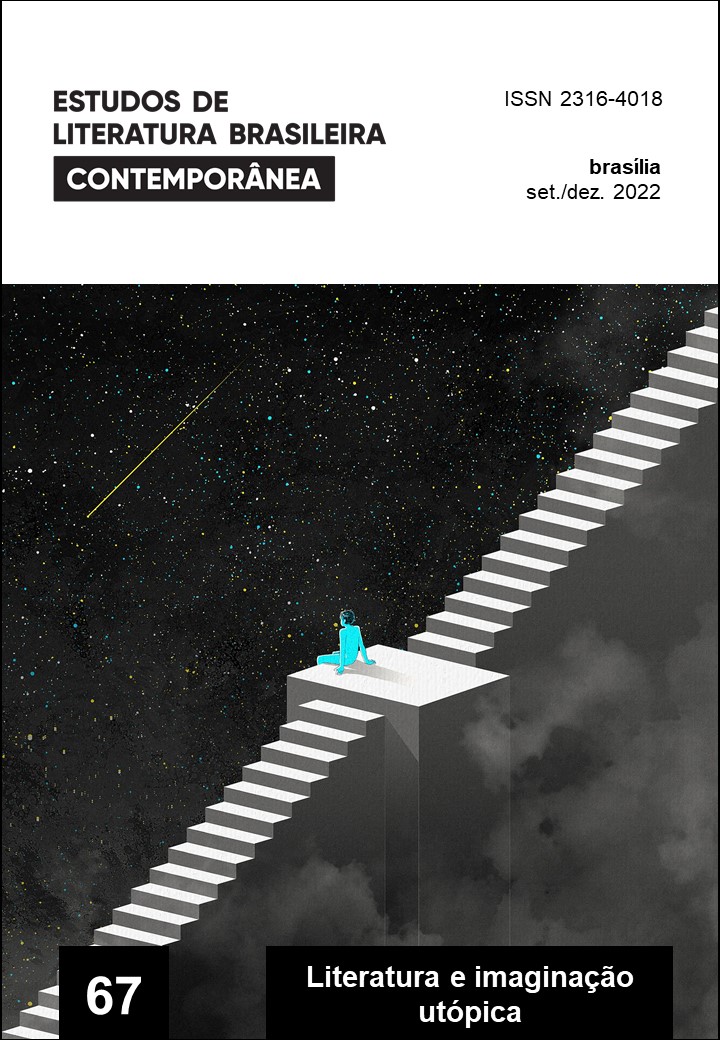Between eutopia and outopia: testimony, decoloniality, and an anthropology of becoming in Um rio sem fim, by Verenilde Pereira
Keywords:
Verenilde Pereira; Um rio sem fim ; Amazon; anthropology of becoming; decolonialismAbstract
Presented as a M.A dissertation at the University of Brasília (UnB), the novel Um rio sem fim (1998), by Verenilde Pereira, in addition to questioning the thresholds that separate the poetic from the academic-scientific discourse, manages to build a decolonial framework in which it establishes a position of resistance to the founding fantasies of the modern idea of utopia that, five centuries after the arrival of the first colonizers, still resist in the Brazilian Amazon region. In the novel, the reader comes across a Salesian mission settled in the north of Amazonas, a place that, commanded by an Italian bishop, reminds what many may be unaware of or prefer to ignore: in some parts of Brazil, fantasies of the New World still survive, supported by ideals of civilizing models and rationalities, both based on an ethnocentric perspective. Knowing that such fantasies are at the roots of the modern sense of utopia, and aware that the relationship between individuals and spaces is fundamental for the understanding of subjectivities and social relations shown in literary construction, it seems to be instigating and fruitful to observe the way in which the term utopia is articulated in Um rio sem fim from the displacement proposed by Thomas Morus, between eutopia, “the place where everything is ok”, and outopia, the “non-place” (Gk ou = not + topos = place). In order to do so, we draw on an anthropology of becoming in conjunction with the concepts of testimony and decoloniality.
References
ADORNO, Theodor W. (1992). Minima Moralia: reflexões a partir da vida danificada. Tradução de Luiz Eduardo Bicca. São Paulo: Ática.
BAUDELAIRE, Charles (2005). As flores do mal Tradução de Pietro Nassetti. São Paulo: Martin Claret.
BIEHL, João (2020). Do incerto ao inacabado: Uma aproximação com a criação etnográfica. Mana, Rio de Janeiro, v. 26, n. 3, p. 1-33. https://doi.org/10.1590/1678-49442020v26n3a206
» https://doi.org/10.1590/1678-49442020v26n3a206
BIEHL, João; LOCKE, Peter (2017). Unfinished: the anthropology of becoming. Durham: Duke University Press.
CUDDON, J. A. (2013). Dictionary of literaty terms & literary theory Hoboken: Blackwell.
DEUS, Zélia Amador de (2021). Prefácio. In: MIRANDA, Danielle Santos de; COSTA, Marcilene Silva da (org.). Perspectivas afroindígenas da Amazônia Curitiba: CRV, p. 9-12.
EVARISTO, Conceição (2017). Becos da memória Rio de Janeiro: Pallas.
FAUSTO, Carlos. Carlos Fausto: entrevista [22 maio 2022]. Entrevistador: Rodrigo Simon de Moraes. São Paulo, 2022. Entrevista inédita, concedida ao projeto de pesquisa, em nível de pós-doutorado na Universidade de Princeton, sobre a literatura de Verenilde Pereira.
GINZBURG, Jaime (2012). Crítica em tempos de violência São Paulo: Editora da Universidade de São Paulo, Fapesp.
MORAES, Antonio Carlos Robert (2005). Ideologias geográficas: espaço, cultura e política no Brasil. São Paulo: Annablume.
MORUS, Thomas (2011). A utopia Tradução de Luís de Andrade. Rio de Janeiro: Nova Fronteira.
PEREIRA, Verenilde S. (1995). Uma etno-experiência na comunicação: era uma vez… Rosa Maria. Dissertação (Mestrado em Comunicação) – Universidade de Brasília, Brasília.
PEREIRA, Verenilde S. (1998). Um rio sem fim Brasília: Thesaurus.
PEREIRA, Verenilde (2022). Verenilde Pereira: entrevista [mar. 2022]. Depoimento. Entrevistador: Rodrigo Simon de Moraes. São Paulo, 2022. Entrevista inédita, concedida ao projeto de pesquisa, em nível de pós-doutorado na Universidade de Princeton, sobre a literatura de Verenilde Pereira.
QUIJANO, Aníbal (2020). Colonialidad del poder, eurocentrismo y América Latina. In: LANDER, Edgardo (org.). La colonialidad del saber: eurocentrismo y ciencias sociales: perspectivas latinoamericanas. Buenos Aires: Fundación CICCUS, p. 219-264.
SELIGMANN-SILVA, Márcio (org.) (2003). História, memória, literatura: o testemunho na era das catástrofes. Campinas: Editora Unicamp.
SIMON, Rodrigo (2022). Verenilde, pioneira da literatura afroindígena. Folha de S. Paulo, São Paulo, 22 maio 2022. Ilustríssima. Disponível em: https://www1.folha.uol.com.br/ilustrissima/2022/05/quem-e-verenilde-pereira-pioneira-da-literatura-afroindigena-no-brasil.shtml Acesso em: 3 jul. 2022.
TODOROV, Tzvetan (2003). A conquista da América: a questão do outro. Tradução de Beatriz Perrone-Moisés. São Paulo: Martins Fontes.
Downloads
Published
Issue
Section
License

This work is licensed under a Creative Commons Attribution-NoDerivatives 4.0 International License.
Authors who publish in this journal agree to the following terms:
a) The authors maintain the copyright and grant the journal the right of first publication, the work being simultaneously licensed under the Creative Commons Attribution License-Non Commercial 4.0 which allows the sharing of the work with acknowledgment of the authorship of the work and publication this journal.
b) Authors are authorized to enter into additional contracts separately, for non-exclusive distribution of the version of the work published in this journal (eg publish in institutional repository or as a book chapter), with authorship recognition and publication in this journal.
c) Authors are allowed and encouraged to publish and distribute their work online (eg in institutional repositories or on their personal page) after the editorial process, as this can generate productive changes, as well as increase the impact and citation of published work (See The Effect of Free Access).
d) The authors of the approved works authorize the magazine to, after publication, transfer its content for reproduction in content crawlers, virtual libraries and the like.
e) The authors assume that the texts submitted to the publication are of their original creation, being fully responsible for their content in the event of possible opposition by third parties.


